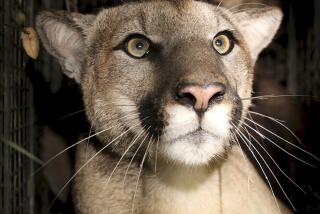It’s a Caiman, Not a Croc, but It’s Still a Bit Menacing
- Share via
School principal Greg Kampf knows that Crocodile Dundee roams the imagination of many a student, so he cracked a thin smile when a 7-year-old burst into his office last week with tales of a “very big alligator” near the playground and a man holding a gun.
Kampf, a two-year veteran of the E.P. Foster School on Ventura Avenue, knew, however, that the playground abutted a residence whose occupant kept an 18-inch reptile as a pet.
“It was just a large lizard last time we saw it,” he said.
But the boy insisted, so Kampf agreed to look behind the chain-link fence that separates the two properties.
What he found slumbering in a 75-gallon aquarium was a 4-foot, crocodile-like reptile known as a caiman. State Department of Fish and Game officials say the caiman, indigenous to Central and South America, grows up to 6 feet in length and its half-inch teeth can snap off a finger faster than most people can say “G’day, mate.”
“I was shocked,” Kampf said. “If some kid lost his ball . . . someone might have gone back there and it could have been a problem.”
No Gunman Found
Although there was no sign of a gunslinger, Kampf immediately called the police, who came out to chat with the caiman’s owner, Michael Newell. A police spokesman said officers were unable to verify the child’s report about a man holding a gun, but after inspecting the toothy reptile they decided that this was a case for Fish and Game.
Warden Jorge Gross arrived an hour later and cited Newell for possession of an exotic animal without a permit.
A 1987 state law prohibits the private ownership of caimans, crocodiles and alligators because they are deemed too dangerous, but a grandfather clause protects those who purchased the pets prior to that date.
In years past, baby caimans were sold at pet shops for under $10. Fish and Game officials say they were popular as novelties but that most of the reptiles died before reaching maturity because owners didn’t know how to care for them.
‘Jaws’ Cared For
Newell could not be reached for comment. Fish and game wardens say he apparently is well-versed in caiman care. He named his pet “Jaws” and fed it enough raw meat so that it grew, slowly but surely, at the rate of a foot a year.
“It’s the largest one I’ve ever seen,” Gross said.
But Jaws was housed in a small aquarium--one that barely fits his scaly frame, the game warden said.
His existence was no secret to the school children who had watched the caiman grow over the years, passing on the knowledge of its existence from class to class, like some antediluvian beast that had crawled out of a science textbook.
But with the cruelty of children, they also had been lobbing rocks at the reptile.
“They had been harassing it for quite a while,” Gross said.
Comes to Surface
It wasn’t until last Friday that the pet came to the attention of the adults, which led to the caiman confiscation.
Fish and Game officials said they secured the reptile’s jaws with a heavy cord that allowed it to breathe through its nose. The reptile was then laid across the lap of a warden for the drive from Ventura to the Animal Regulation Department shelter in Camarillo.
Jaws will remain there until its owner obtains the necessary permit and builds a larger and more secure home for his pet.
Gross said Newell has already begun to fill out paper work for the permit.
As for the children at E.P. Foster, their attention has now shifted to other exotic animals.
“Another house near the school has monkeys in the backyard,” Principal Kampf said. The authorities, recently alerted to this latest wildlife of Ventura Avenue, are investigating.
Meanwhile, Kampf asked, “Why take field trips to the zoo?”
More to Read
Sign up for Essential California
The most important California stories and recommendations in your inbox every morning.
You may occasionally receive promotional content from the Los Angeles Times.










